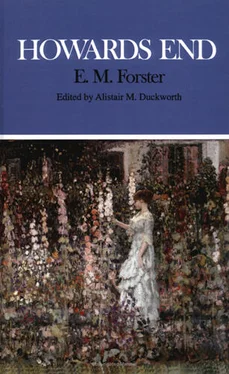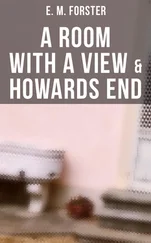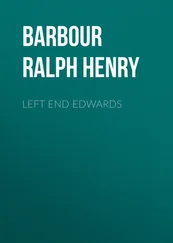Edward Morgan Forster - Howards End
Здесь есть возможность читать онлайн «Edward Morgan Forster - Howards End» весь текст электронной книги совершенно бесплатно (целиком полную версию без сокращений). В некоторых случаях можно слушать аудио, скачать через торрент в формате fb2 и присутствует краткое содержание. Жанр: Классическая проза, на английском языке. Описание произведения, (предисловие) а так же отзывы посетителей доступны на портале библиотеки ЛибКат.
- Название:Howards End
- Автор:
- Жанр:
- Год:неизвестен
- ISBN:нет данных
- Рейтинг книги:3 / 5. Голосов: 1
-
Избранное:Добавить в избранное
- Отзывы:
-
Ваша оценка:
- 60
- 1
- 2
- 3
- 4
- 5
Howards End: краткое содержание, описание и аннотация
Предлагаем к чтению аннотацию, описание, краткое содержание или предисловие (зависит от того, что написал сам автор книги «Howards End»). Если вы не нашли необходимую информацию о книге — напишите в комментариях, мы постараемся отыскать её.
Howards End — читать онлайн бесплатно полную книгу (весь текст) целиком
Ниже представлен текст книги, разбитый по страницам. Система сохранения места последней прочитанной страницы, позволяет с удобством читать онлайн бесплатно книгу «Howards End», без необходимости каждый раз заново искать на чём Вы остановились. Поставьте закладку, и сможете в любой момент перейти на страницу, на которой закончили чтение.
Интервал:
Закладка:
"I'll ask, sir."
"No, don't bother."
"They have taken the car to Howards End," said the parlourmaid to Leonard.
He thanked her, and asked whereabouts that place was.
"You appear to want to know a good deal," she remarked. But Margaret had forbidden her to be mysterious. She told him against her better judgment that Howards End was in Hertfordshire.
"Is it a village, please?"
"Village! It's Mr. Wilcox's private house—at least, it's one of them. Mrs. Wilcox keeps her furniture there. Hilton is the village."
"Yes. And when will they be back?"
"Mr. Schlegel doesn't know. We can't know everything, can we?" She shut him out, and went to attend to the telephone, which was ringing furiously.
He loitered away another night of agony. Confession grew more difficult. As soon as possible he went to bed. He watched a patch of moonlight cross the floor of their lodging, and, as sometimes happens when the mind is overtaxed, he fell asleep for the rest of the room, but kept awake for the patch of moonlight. Horrible! Then began one of those disintegrating dialogues. Part of him said: "Why horrible? It's ordinary light from the room." "But it moves." "So does the moon." "But it is a clenched fist." "Why not?" "But it is going to touch me." "Let it." And, seeming to gather motion, the patch ran up his blanket. Presently a blue snake appeared; then another, parallel to it. "Is there life in the moon?" "Of course." "But I thought it was uninhabited." "Not by Time, Death, Judgment, and the smaller snakes." "Smaller snakes!" said Leonard indignantly and aloud. "What a notion!" By a rending effort of the will he woke the rest of the room up. Jacky, the bed, their food, their clothes on the chair, gradually entered his consciousness, and the horror vanished outwards, like a ring that is spreading through water.
"I say, Jacky, I'm going out for a bit."
She was breathing regularly. The patch of light fell clear of the striped blanket, and began to cover the shawl that lay over her feet. Why had he been afraid? He went to the window, and saw that the moon was descending through a clear sky. He saw her volcanoes, and the bright expanses that a gracious error has named seas. They paled, for the sun, who had lit them up, was coming to light the earth. Sea of Serenity, Sea of Tranquillity, Ocean of the Lunar Storms, merged into one lucent drop, itself to slip into the sempiternal dawn. And he had been afraid of the moon!
He dressed among the contending lights, and went through his money. It was running low again, but enough for a return ticket to Hilton. As it clinked Jacky opened her eyes.
"Hullo, Len! What ho, Len!"
"What ho, Jacky! see you again later."
She turned over and slept.
The house was unlocked, their landlord being a salesman at Convent Garden. Leonard passed out and made his way down to the station. The train, though it did not start for an hour, was already drawn up at the end of the platform, and he lay down in it and slept. With the first jolt he was in daylight; they had left the gateways of King's Cross, and were under blue sky. Tunnels followed, and after each the sky grew bluer, and from the embankment at Finsbury Park he had his first sight of the sun. It rolled along behind the eastern smokes—a wheel, whose fellow was the descending moon—and as yet it seemed the servant of the blue sky, not its lord. He dozed again. Over Tewin Water it was day. To the left fell the shadow of the embankment and its arches; to the right Leonard saw up into the Tewin Woods and towards the church, with its wild legend of immortality. Six forest trees—that is a fact—grow out of one of the graves in Tewin churchyard. The grave's occupant—that is the legend—is an atheist, who declared that if God existed, six forest trees would grow out of her grave. These things in Hertfordshire; and farther afield lay the house of a hermit—Mrs. Wilcox had known him—who barred himself up, and wrote prophecies, and gave all he had to the poor. While, powdered in between, were the villas of business men, who saw life more steadily, though with the steadiness of the half-closed eye. Over all the sun was streaming, to all the birds were singing, to all the primroses were yellow, and the speedwell blue, and the country, however they interpreted her, was uttering her cry of "now." She did not free Leonard yet, and the knife plunged deeper into his heart as the train drew up at Hilton. But remorse had become beautiful.
Hilton was asleep, or at the earliest, breakfasting. Leonard noticed the contrast when he stepped out of it into the country. Here men had been up since dawn. Their hours were ruled, not by a London office, but by the movements of the crops and the sun. That they were men of the finest type only the sentimentalist can declare. But they kept to the life of daylight. They are England's hope. Clumsily they carry forward the torch of the sun, until such time as the nation sees fit to take it up. Half clodhopper, half board-school prig, they can still throw back to a nobler stock, and breed yeomen.
At the chalk pit a motor passed him. In it was another type, whom Nature favours—the Imperial. Healthy, ever in motion, it hopes to inherit the earth. It breeds as quickly as the yeoman, and as soundly; strong is the temptation to acclaim it as a super-yeoman, who carries his country's virtue overseas. But the Imperialist is not what he thinks or seems. He is a destroyer. He prepares the way for cosmopolitanism, and though his ambitions may be fulfilled, the earth that he inherits will be grey.
To Leonard, intent on his private sin, there came the conviction of innate goodness elsewhere. It was not the optimism which he had been taught at school. Again and again must the drums tap, and the goblins stalk over the universe before joy can be purged of the superficial. It was rather paradoxical, and arose from his sorrow. Death destroys a man, but the idea of death saves him—that is the best account of it that has yet been given. Squalor and tragedy can beckon to all that is great in us, and strengthen the wings of love. They can beckon; it is not certain that they will, for they are not love's servants. But they can beckon, and the knowledge of this incredible truth comforted him.
As he approached the house all thought stopped. Contradictory notions stood side by side in his mind. He was terrified but happy, ashamed, but had done no sin. He knew the confession: "Mrs. Wilcox, I have done wrong," but sunrise had robbed its meaning, and he felt rather on a supreme adventure.
He entered a garden, steadied himself against a motor-car that he found in it, found a door open and entered a house. Yes, it would be very easy. From a room to the left he heard voices, Margaret's amongst them. His own name was called aloud, and a man whom he had never seen said, "Oh, is he there? I am not surprised. I now thrash him within an inch of his life."
"Mrs. Wilcox," said Leonard, "I have done wrong."
The man took him by the collar and cried, "Bring me a stick." Women were screaming. A stick, very bright, descended. It hurt him, not where it descended, but in the heart. Books fell over him in a shower. Nothing had sense.
"Get some water," commanded Charles, who had all through kept very calm. "He's shamming. Of course I only used the blade. Here, carry him out into the air."
Thinking that he understood these things, Margaret obeyed him. They laid Leonard, who was dead, on the gravel; Helen poured water over him.
"That's enough," said Charles.
"Yes, murder's enough," said Miss Avery, coming out of the house with the sword.
Chapter 42
When Charles left Ducie Street he had caught the first train home, but had no inkling of the newest development until late at night. Then his father, who had dined alone, sent for him, and in very grave tones inquired for Margaret.
Читать дальшеИнтервал:
Закладка:
Похожие книги на «Howards End»
Представляем Вашему вниманию похожие книги на «Howards End» списком для выбора. Мы отобрали схожую по названию и смыслу литературу в надежде предоставить читателям больше вариантов отыскать новые, интересные, ещё непрочитанные произведения.
Обсуждение, отзывы о книге «Howards End» и просто собственные мнения читателей. Оставьте ваши комментарии, напишите, что Вы думаете о произведении, его смысле или главных героях. Укажите что конкретно понравилось, а что нет, и почему Вы так считаете.












